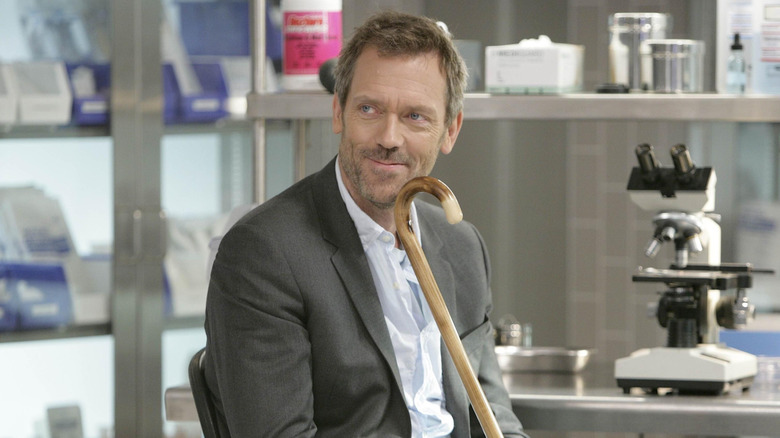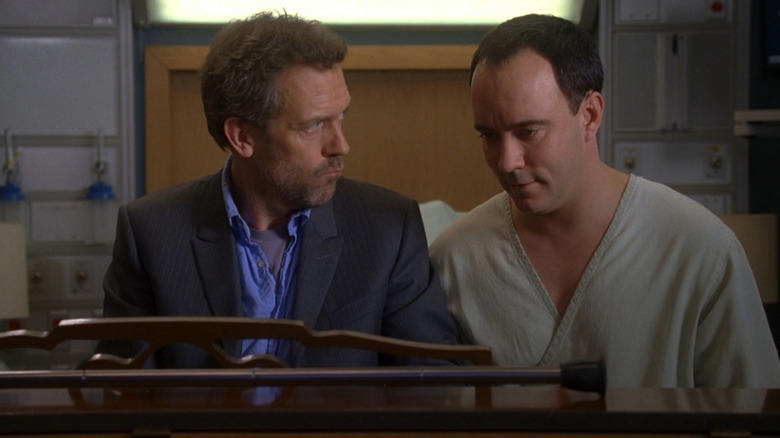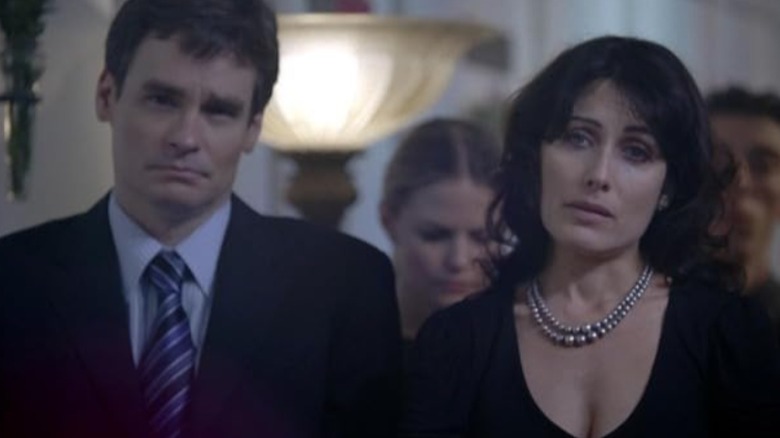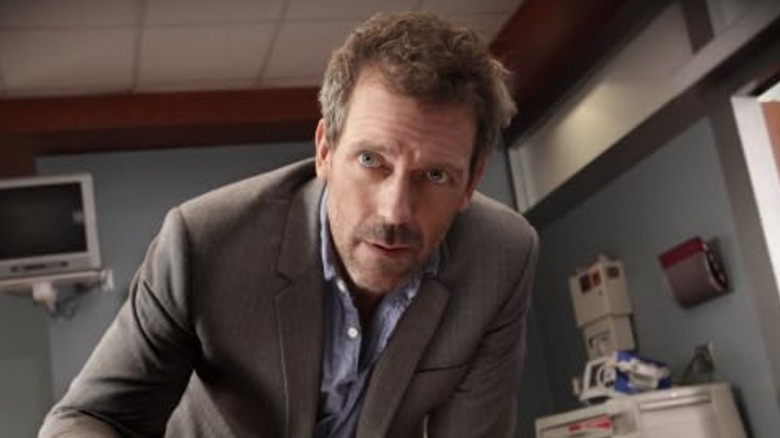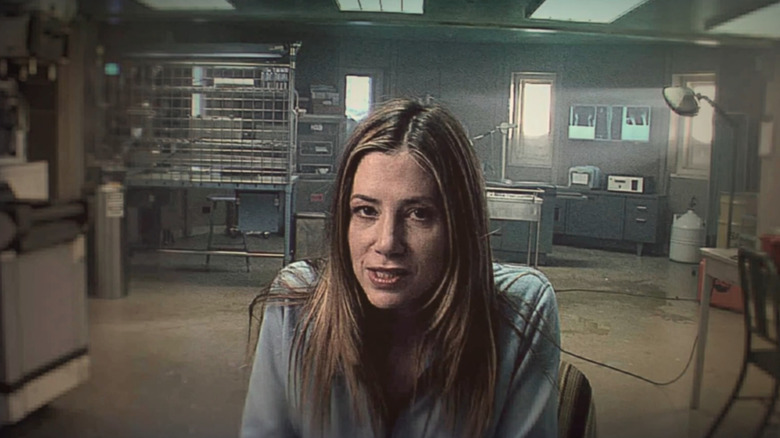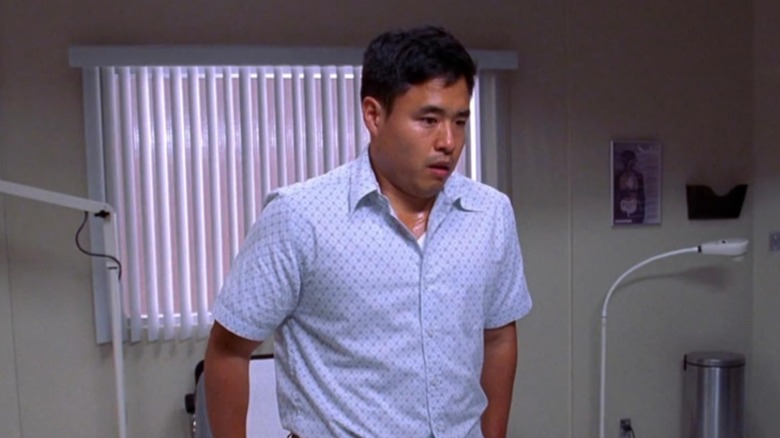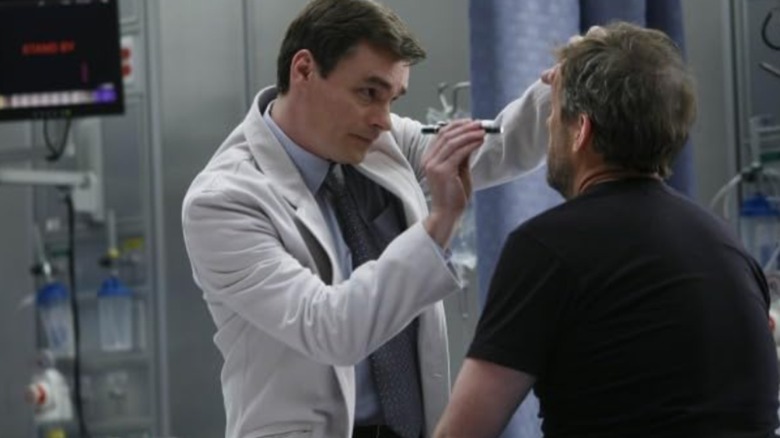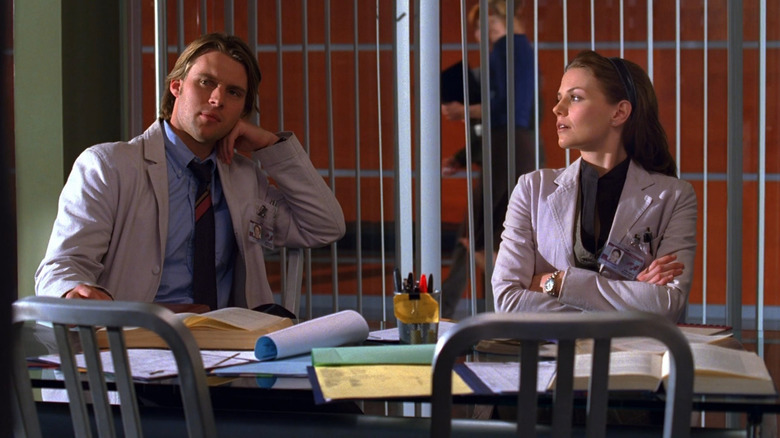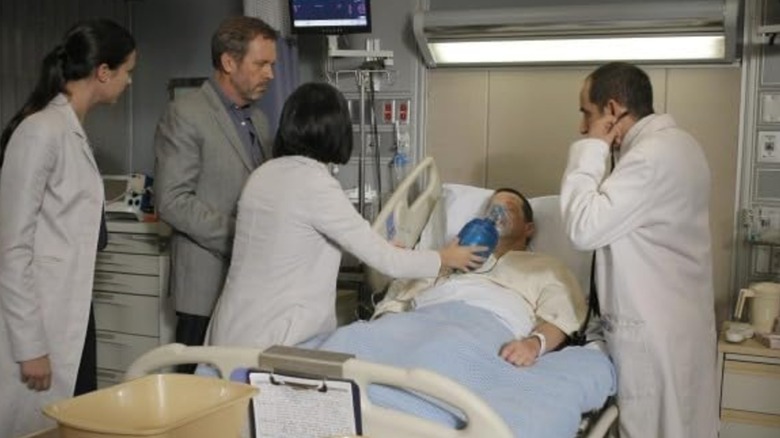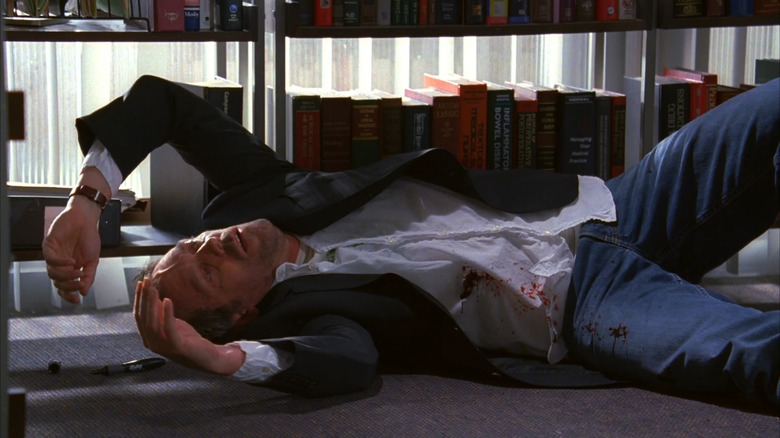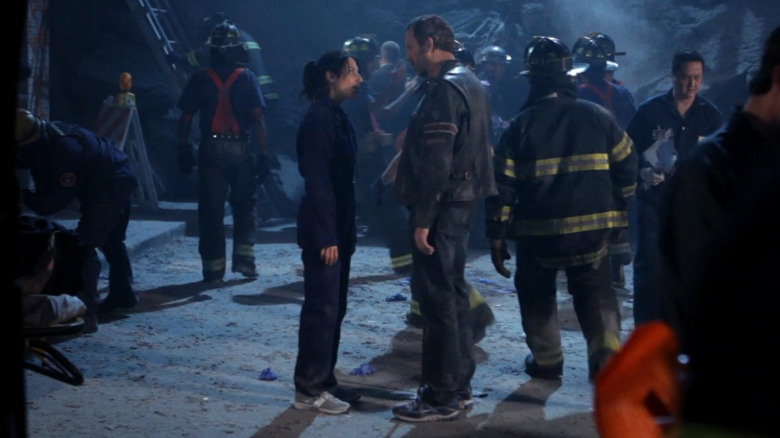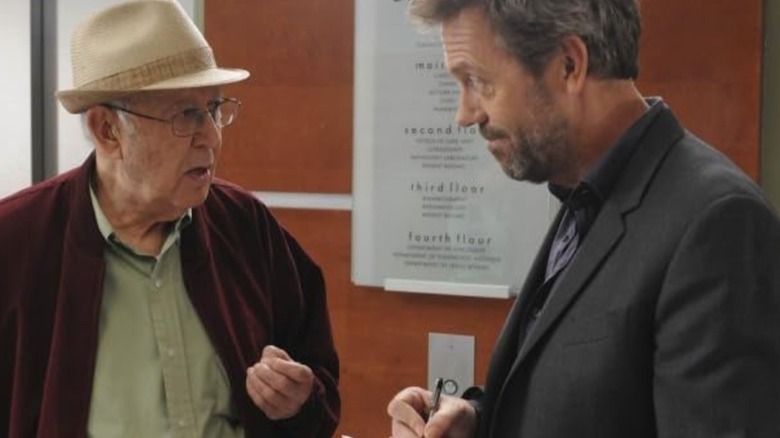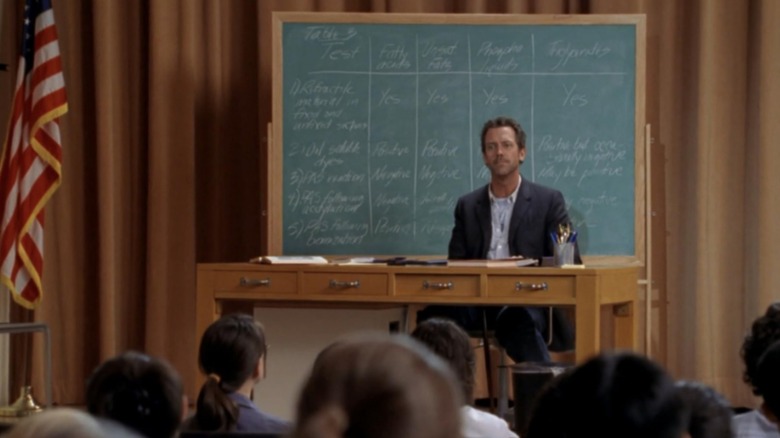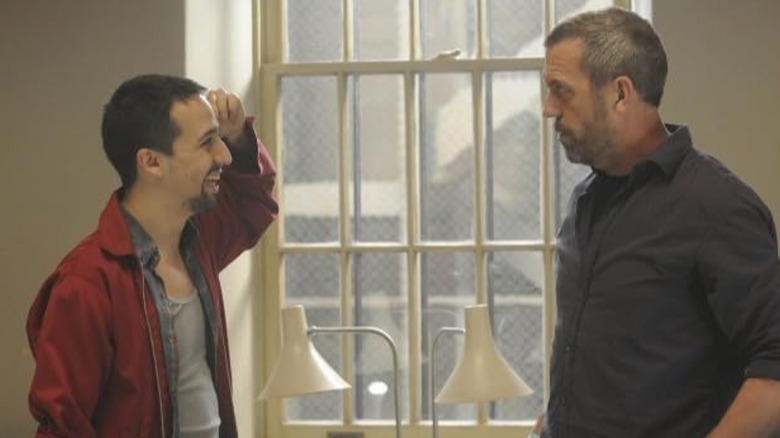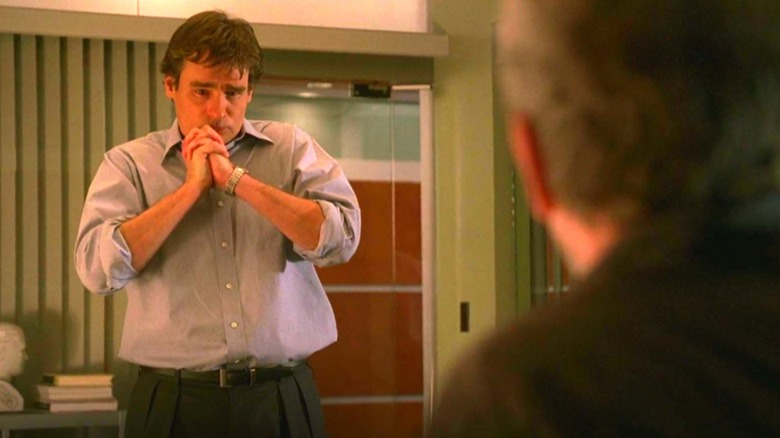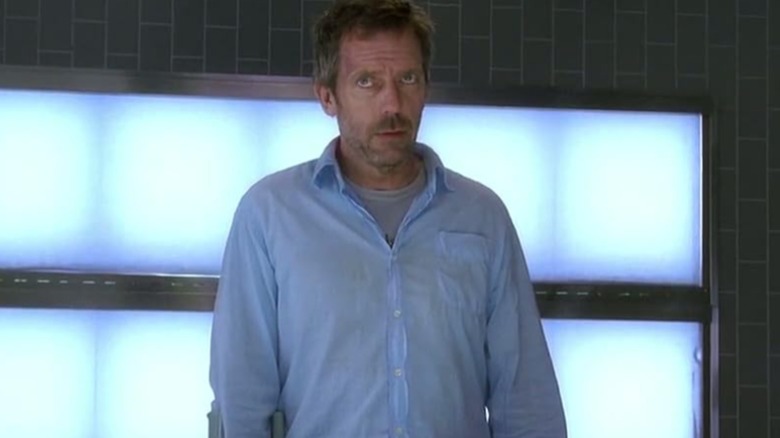The 15 Best Episodes Of House, M.D. Ranked
Well over a decade since its final episode aired, "House, M.D." still stands out as one of the best medical dramas ever to grace the small screen. Far more than just a standard medical procedural, the series was known not just for its complicated medical mysteries but the fascinating process by which its surly doc and his team arrived at their answers. Fueled by a seemingly endless supply of Big Pharma's finest opioids and an arsenal of snarky quips, misanthropic pain patient and flagrant drug user Dr. Gregory House (Hugh Laurie) leads his team of diagnosticians down one rabbit hole after another, each more interesting than the last.
In these tough times, we need a straight-shooter like House more than ever. He never met a patient he didn't not like, and he never met a rule, law, or authority figure that wasn't worth challenging — but that's all just part of his charm. That, and the fact that he's always ready with a good, old-fashioned savaging in his front pocket ready to go anytime someone needs to be read for absolute filth.
Out of eight seasons and 177 episodes, it's tough to pick the best episodes of "House, M.D.," which is why we went to IMDb to find out what the true fans are saying. Check them out for yourself to find out why "House, M.D." was once the most popular show on television.
15. Half-Wit (Season 3, Episode 15)
One of the many things that made "House, M.D." so good was the show's fairly nonstop stream of famous guest stars and actors you forgot were in "House." Such was the case when the singer-songwriter frontman for The Dave Matthews Band appeared as the lead guest star of "Half-Wit" alongside Kurtwood Smith, best known for playing Red Forman on "That '70s Show."
The episode's central mystery deals with Patrick Obyedkov (Matthews). After suffering a severe traumatic brain injury as a kid in a bus accident that killed his mother, Patrick is left with a childlike mind, seizures, and an enigmatic gift for piano despite having no musical knowledge beforehand. A musician himself, House is drawn to the case and tries to get to the root of how Patrick's brain works, ultimately making a discovery that forces his dad to make a painful decision.
Despite the detached persona House constantly works to curate, the episode does a good job of subtly revealing the gooey center lurking underneath the doc's hard exterior. Kurtwood Smith is here to remind us that he is more than just a comedy actor, and Dave Matthews is charming and somehow quietly heartbreaking in his portrayal of Patrick.
14. Simple Explanation (Season 5, Episode 20)
"Simple Explanation" gives the entire "House, M.D." cast a chance to stretch their acting muscles by forcing House's team to contend with the unanticipated death of Lawrence Kutner (Kal Penn), who dies by suicide. The profoundly emotional death coincided with Kal Penn's real reason for leaving "House" as he went to work for the Obama administration as Public Liaison for the White House Office of Public Engagement, which came as a shock to most fans at the time.
Despite having discovered Kutner's body, Thirteen (Olivia Wilde) and Foreman (Omar Epps) have to process their feelings on their feet as they race against the clock to save married couple Eddie (Meat Loaf) and Charlotte (Colleen Camp), who, as per usual, appear to be dying from a range of enigmatic symptoms. As the stages of grief play out through House's team and both Cuddy (Lisa Edelstein) and Wilson (Robert Sean Leonard), even House is affected.
13. Locked In (Season 5, Episode 19)
"Locked In" deals with an absolutely terrifying prospect: That of locked-in syndrome, a condition where a patient can perceive his or her surroundings but is unable to move or communicate in any way. House first discovers his patient (Mos Def) after finding himself in a motorcycle accident and ending up next to another patient from a bicycling accident. The attending doctor, certain the patient is dead, is ready to harvest his heart for a transplant when House intervenes, having noticed the patient's eyes tracking the doctor.
After transferring the bike patient to Princeton-Plainsboro, House and his team search for ways to communicate with him, first through eyelid movement and then a brain-computer interface suggested by Taub (Peter Jacobson). Part of what makes this episode so incredible to watch is the storytelling style, with much of the narrative shown from the locked-in patient's perspective. The medical mystery at the heart of this episode is an absolute banger, with the team ruling out everything from heavy metal poisoning to herpes before arriving at the solution.
12. Frozen (Season 4, Episode 11)
Guest-starring Oscar winner Mira Sorvino, "Frozen" puts House's gifts to the ultimate test when he is enlisted to help diagnose a patient from the other end of the globe. Cate Milton (Sorvino), a psychiatrist currently based out of Antarctica, begins to experience serious medical problems and weather prevents her evacuation. The novelty of the remote webcam diagnostic process is a big part of the episode's appeal. But its true charm is the flirtatious relationship that develops between House and Milton as he continues to work with her, particularly given how emotionally closed off House tends to be.
As the differential diagnostics progress, House experiences the emotional turmoil he is used to inflicting on others when he callously hyperfocuses on the science of their conditions rather than the humanity. Beyond just the flirting, there's something intimate about the camera and the way it forces him face-to-face with his patient that allows House to connect in a way that he typically doesn't, forcing him to empathize with her more profoundly as he checks her for cancer and autoimmune disease.
11. Autopsy (Season 2, Episode 2)
"House, M.D." is full of absolutely bonkers moments that no medical board in their right minds would let pass, and "Autopsy" is a perfect example of this. The episode stars a very young Sasha Pieterse, who would go on to star in "Pretty Little Liars," in a brilliant and touching portrayal of nine-year-old terminal cancer patient Andie. When Andie begins suffering from hallucinations, she ends up in front of House, who is baffled and frustrated by the immense bravery she shows in the face of a terminal condition despite her young age. After determining Andie has a dangerous blood clot deployed by the cancer and hidden somewhere in her body, House comes up with a strange plan to find it: draining some of her blood to perform an "autopsy" on Andie's still-living body.
Many fans consider this one of the best child performances in the series. But besides Pieterse's impressive turn, the episode features an amusing appearance from "The Office" hero Asian Jim and eventual MCU agent Randall Park as House's weekly clinic patient.
10. Under My Skin (Season 5, Episode 23)
Set in the aftermath of Kutner's death, "Under My Skin" finds House dealing with ongoing hallucinations of Amber Volakis AKA Cutthroat Bi*** (Anne Dudek). House's already tenuous mental health continues to deteriorate as he works with his team to diagnose the case of the week, a prima ballerina (Jamie Tisdale) who suffers a severe antibiotic reaction with deeply unpleasant consequences to her lungs and skin.
The episode ultimately cultimates in a handful of big moments for House, moments with major implications for Huddy shippers as House comes to terms with the fact that his dependence on Vicodin has taken control of his life and mental health. The medical mystery at the heart of the episode is far less intriguing than the darkly comedic moments between House and Amber and the significant changes that potentially leave House's future at Princeton-Plainsboro up in the air as he begins the painful detox process in a mental facility.
9. Euphoria (Season 2, Episodes 20 and 21)
The two-part "Euphoria" begins with one of House's more bizarre cases, where a police officer (Scott Michael Campbell) suddenly begins laughing uncontrollably even after getting shot before suddenly shifting to experience excruciating pain. It's all fun and games in the diagnostics room until Foreman starts to exhibit the same symptoms, causing them both to be put in isolation.
The stakes get even higher when the police officer dies, leaving the team to wonder if they could have an unidentified but highly contagious pandemic on their hands. Things only go downhill from there, with Foreman at one point completely losing his vision while performing an old-fashioned icepick lobotomy on his deceased roomie. The two-parter is a perfect example of how "House" manages to put out completely unhinged storylines and still somehow make them believably suspenseful and emotional. And it's nice to finally get a Foreman episode that gives Omar Epps a chance to truly show his talent.
8. Everybody Dies (Season 8, Episode 22B)
The very last episode of the series, "Everybody Dies," deals with House having to face the consequences of his own messy life decisions and the emotional reality of the fact that his best friend Wilson is dying. After years of jamming his feelings down with sarcasm and Vicodin, House has finally reached a place where there's nowhere left to go, and he's got felony vandalism charges to face at the end of that dead-end road.
Like the perennial drama queen he can't help but be, House avoids all of it by faking his own death, switching his dental records with those of a recently deceased heroin addict (James LeGros) to seal the deal. Now free from his life (and any hope of ever practicing medicine again), he is ready to literally ride out into the sunset with his bestie to spend Wilson's final days experiencing the open road together. It's a bittersweet end to House's (and Wilson's) story, but it's also the most at peace we've seen House since the beginning of the series — even if he had to commit multiple felonies to get there.
7. No Reason (Season 2, Episode 24)
After two seasons of watching House get away with speaking to patients in ways that should have, by all rights, ended with him getting decked at some point, "No Reason" finally sees House get a little something in the way of comeuppance. A former patient's husband, a man named Jack Moriarty (Elias Koteas), walks right into the hospital and shoots him. But because this is "House," House wakes up in a hospital bed next to the guy and can't leave well enough alone.
It turns out it wasn't House's medical care but his keen powers of deduction that got to Moriarty, who was forced to admit he had cheated on her as part of House's diagnostic process. The admission ultimately lead to her death, causing Moriarty to target House in an effort to make him suffer. As the men talk through their issues, House starts to diagnose Moriarty's issues, all while beginning to suffer from hallucinations and blackouts. The episode does a good job of blurring the lines between reality and delusion, at the same time providing a look into House's innermost thoughts.
6. Help Me (Season 6, Episode 21)
With "Help Me," "House, M.D." brings House and Cuddy out of the hospital when they arrive to help with the aftermath of a crane accident that collapses a building. The accident scene and the interactions between House and Cuddy are used as a backdrop for telling the story of how House nearly lost his leg, what Cuddy did to help save him, and the complicated story of his relationship with the man she first met years ago at the University of Michigan.
The episode does a good job of finally grounding the Cuddy-House relationship in lore infused with trauma bonding that sheds some light on the weight of their interactions and their frequently inconsistent behavior toward one another. As House finds himself in the same position Cuddy was in when she made the decision that would leave him with lasting pain, he's faced with everything that's most important to him in life: Drugs, his complicated feelings for Cuddy, and the ultimate high he gets from diagnosing medical mysteries.
5. Both Sides Now (Season 5, Episode 24)
The follow-up to "Under My Skin," "Both Sides Now" is the "House" episode that takes everything warm and gushy fans got at the end of the last episode and slaps them firmly upside the brain with it. After what appears to be just one night of painful detox that culminates in a hot and spicy lovemaking sesh with Cuddy in the previous episode, House seemingly miraculously wakes up without any pain or withdrawal symptoms. Cuddy is gone, but he pockets her lipstick to take with him after finding it in his bathroom. House carries it with him throughout the day as he works the case of Scott (Ashton Holmes), an epileptic patient who was left with alien hand syndrome after a medical procedure.
As the episode progresses, House takes out the lipstick to look at from time to time, a habit that gets turned upside down when the episode reveals a big plot twist regarding House's perception of the entire Cuddy situation.
4. Three Stories (Season 1, Episode 21)
"Three Stories" is another one of those "House, M.D." episodes that takes a departure from the typical format in a way that pays off. The episode centers around House substitute teaching a college medical course for a sick professor. While there, he entertains the students with three equally fascinating tales of medical mysteries he and his team ostensibly handled at some point, challenging the med students to come up with diagnoses as he goes.
In the first case, House recalls a farmer who was bitten by a snake. In an effort to find out which antivenom they need, Chase (Jesse Spencer) and Foreman investigate his farm. But when they test the snake and learn it hasn't bitten anyone recently and the farmer suffers an allergic reaction, they realize it isn't a snake bite that caused his problems — a classic example of House's axiom that everybody lies. The second case deals with a teen volleyball player suffering from two different medical conditions. For the third, House uses a fictional story about Carmen Electra playing mini golf to reveal the untold truth of House's own medical history, an infarction caused by a leg aneurysm. House's storytelling and unreliable narration infuse humor in a format that might appear weak on any other show, but work here.
3. Broken (Season 6, Episode 1)
Right around the same time Lin-Manuel Miranda was penning "Hamilton," he was also appearing as what some fans say is the most underrated character in the "House" universe as the self-described "manic Hispanic" Juan "Alvie" Alvarez, House's roommate in the psychiatric hospital. A bipolar patient who refuses his meds, Alvie is too much for House to take at first but invariably grows on the curmudgeonly doctor as he agrees to help out with House's varied escape efforts.
More to the point, House begins to see the very real harm he could be causing Alvie, a revelation that eventually causes him to accept his fate there for the time being and even join in with Alvie during the talent show in one of the show's sweeter moments. His relationship with Alvie bleeds over into "Baggage," after which House's former roomie ships himself off to Arizona, never to be heard from again.
2. Wilson's Heart (Season 4, Episode 16)
"House, M.D." has its share of tearjerker moments. But none compare to the emotional wrecking ball that is "Wilson's Heart," the episode that says goodbye to House's erstwhile nemesis and competition for Wilson's feelings, Cutthroat Bi*** Amber.
The episode begins with a bus crash. On that bus were Amber and House, who can't quite remember what happened at first as Amber suffers from an unexplained set of symptoms that shouldn't be caused by the crash. As he pieces it together, House remembers calling Wilson's phone for a ride home from the bar. Amber came in his place, taking a hefty dose of meds for her flu en route. Because of the bus crash, her body can't filter anything out, leaving her to die in Wilson's arms not long after they'd begun to fall in love with each other. The brilliantly written turn of events reveals volumes: The fullness of House's bitterness, the toxicity underlying his dependence on Wilson, and most of all, the tragedy of a love and a life unrealized.
1. House's Head (Season 4, Episode 15)
The follow-up to "Wilson's Heart," "House's Head" deals with House's efforts to piece together the bus crash and the events leading up to it as he struggles with post-traumatic retrograde amnesia and a hefty dose of repressed guilt. But in the world of Princeton-Plainsboro, working through one's trauma is a way of life, so House presses on as the team works to identify whether the bus crash was caused by a medical incident affecting the bus driver.
As House tackles the central diagnostic problem, he begins to hallucinate. As with several other "House" episodes, the episode cleverly employs a twist to eventually reveal a vision of Amber haunting House's mind. This is the point at which House starts seeing Amber, both as a representation of his inner dialogue that helps him solve cases and a manifestation of his guilt over both Amber's death and Wilson's pain.
What makes this episode so good is what it reveals about House through his confused perspective. While "Wilson's Heart" is sad because it evokes sympathy over Wilson's loss and heartache, the tragedy of "House's Head" is in seeing how lonely and dark his reality has become.
